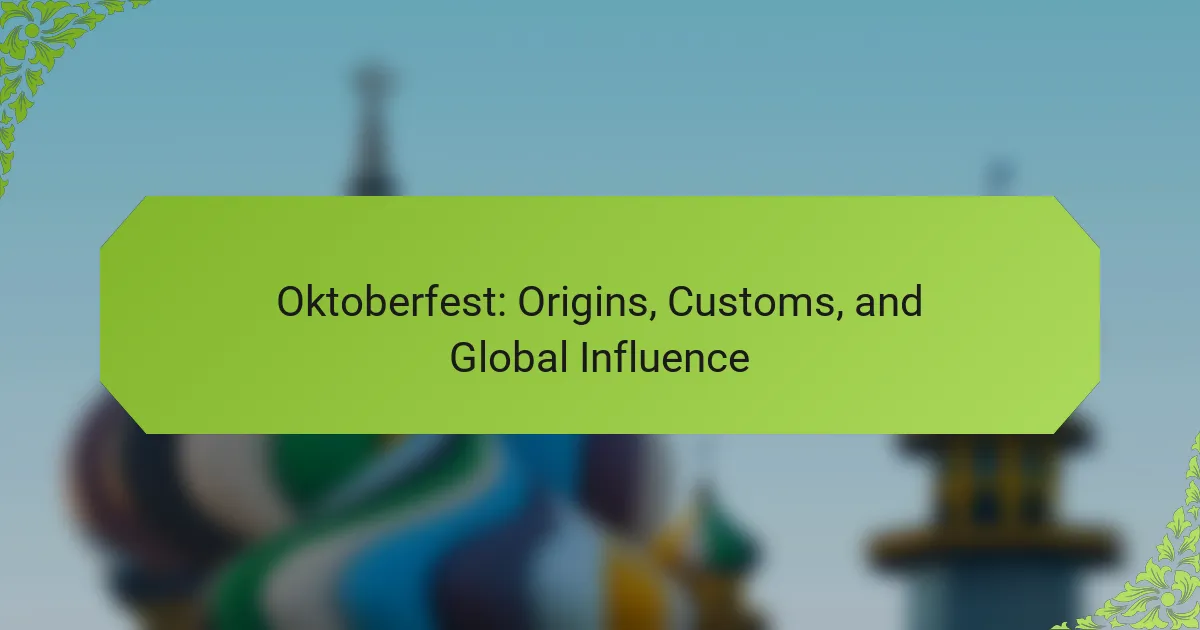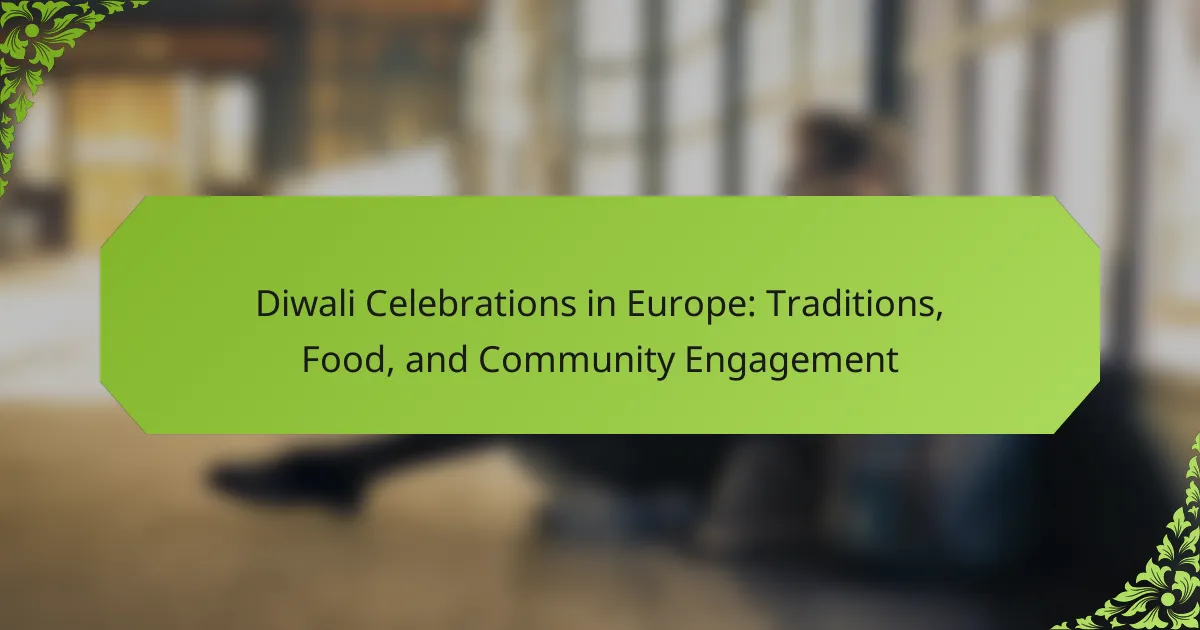Oktoberfest attracts millions globally, celebrating Bavarian culture through traditional foods, music, and beer. This article explores its origins as a royal wedding celebration, highlights festive customs like the ceremonial keg tapping, and examines its global influence on local celebrations and economies. Additionally, it addresses sustainability efforts and future trends shaping the festival.
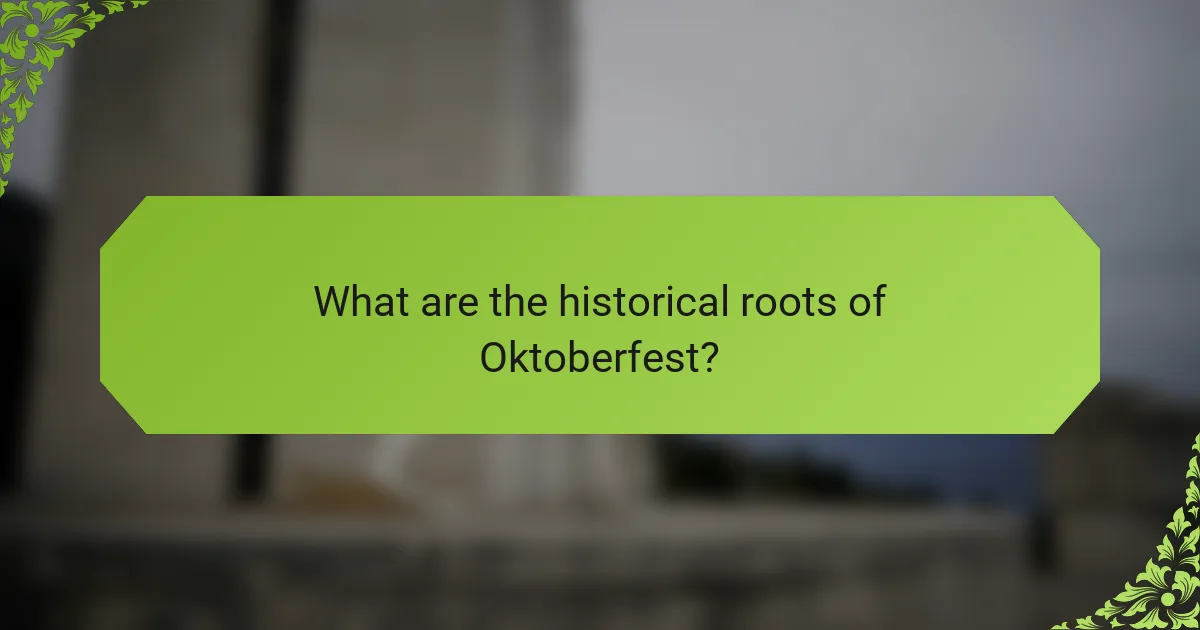
What are the historical roots of Oktoberfest?
Oktoberfest originated in 1810 as a royal wedding celebration in Munich, Germany. The event marked the marriage of Crown Prince Ludwig to Princess Therese of Saxe-Hildburghausen. Over the years, it evolved from a local festival into a global celebration of Bavarian culture, featuring traditional foods, music, and, notably, beer. Today, Oktoberfest attracts millions of visitors annually, showcasing its unique attributes such as large tents and diverse entertainment. This transformation illustrates the festival’s rare ability to maintain cultural significance while adapting to modern influences.
How did the original wedding celebration evolve into a global festival?
Oktoberfest evolved from a royal wedding celebration in 1810 into a global festival celebrated annually. Originally held to honor the marriage of Crown Prince Ludwig of Bavaria to Princess Therese, the event featured horse races and local agricultural exhibitions. Over time, it transformed into a 16- to 18-day festival showcasing Bavarian culture, food, and beer. Today, Oktoberfest attracts millions of visitors worldwide, influencing similar celebrations globally, reflecting its unique attribute of fostering community and cultural exchange.
Which key events shaped the development of Oktoberfest over the decades?
Key events that shaped Oktoberfest include its inception in 1810, the introduction of beer tents in the 1890s, and the impact of both World Wars. The festival began as a royal wedding celebration, evolving into a major cultural event. The establishment of the traditional Oktoberfest beer style and the global spread of the festival in the late 20th century further defined its character. Each of these milestones contributed to Oktoberfest’s unique identity as a celebration of Bavarian culture and beer.
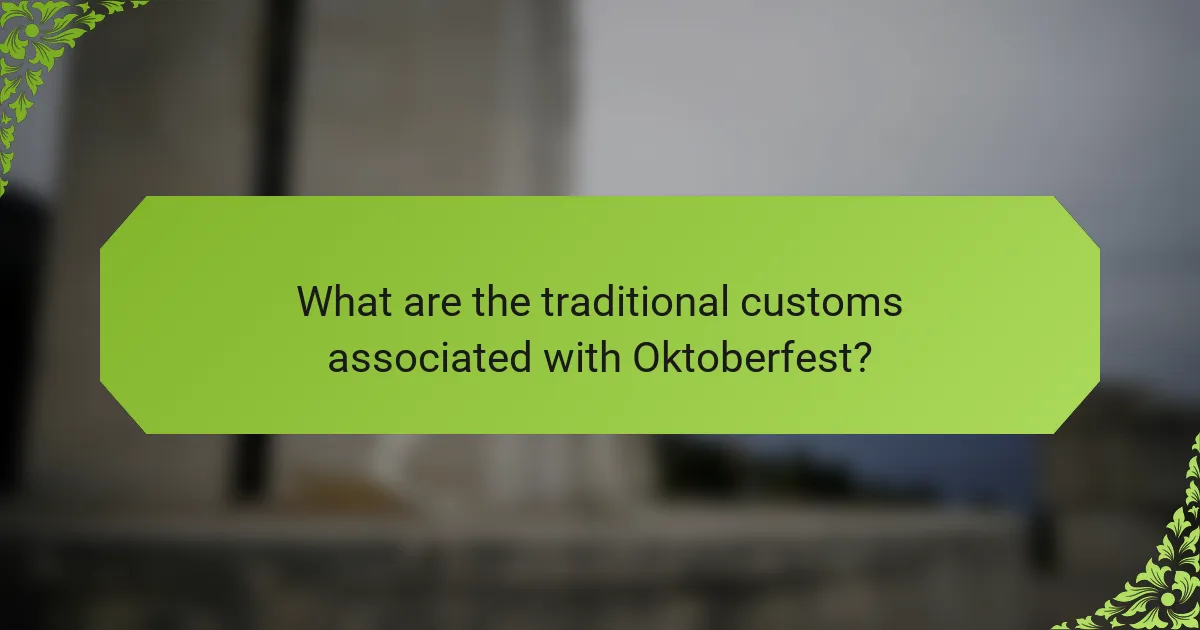
What are the traditional customs associated with Oktoberfest?
Oktoberfest is celebrated with traditional customs that include lively parades, authentic Bavarian music, and festive attire. Beer tents serve a variety of local brews, while traditional foods like pretzels and sausages are enjoyed. The event also features folk dances and games, creating a vibrant atmosphere. Unique to Oktoberfest, the ceremonial tapping of the first keg marks the official start of the festival, showcasing its rich cultural heritage.
How do food and beverage offerings reflect regional influences?
Food and beverage offerings at Oktoberfest reflect regional influences through traditional Bavarian cuisine and local brews. Dishes like pretzels, sausages, and roast chicken showcase local ingredients and culinary customs. The festival emphasizes the significance of beer, particularly Märzen, a style originating in Bavaria, highlighting its cultural importance. Regional variations in food and drink offerings enhance the festival’s authenticity and appeal, connecting visitors to local heritage.
What role do traditional attire play in the festival experience?
Traditional attire enhances the festival experience by fostering cultural identity and community spirit. At Oktoberfest, wearing traditional Bavarian clothing like lederhosen and dirndls creates a festive atmosphere and connects attendees to the festival’s origins. This attire symbolizes pride in heritage and encourages participation in customs, such as folk dances and music. Additionally, the visual impact of these outfits contributes to the overall ambiance, making the event memorable for both locals and tourists.
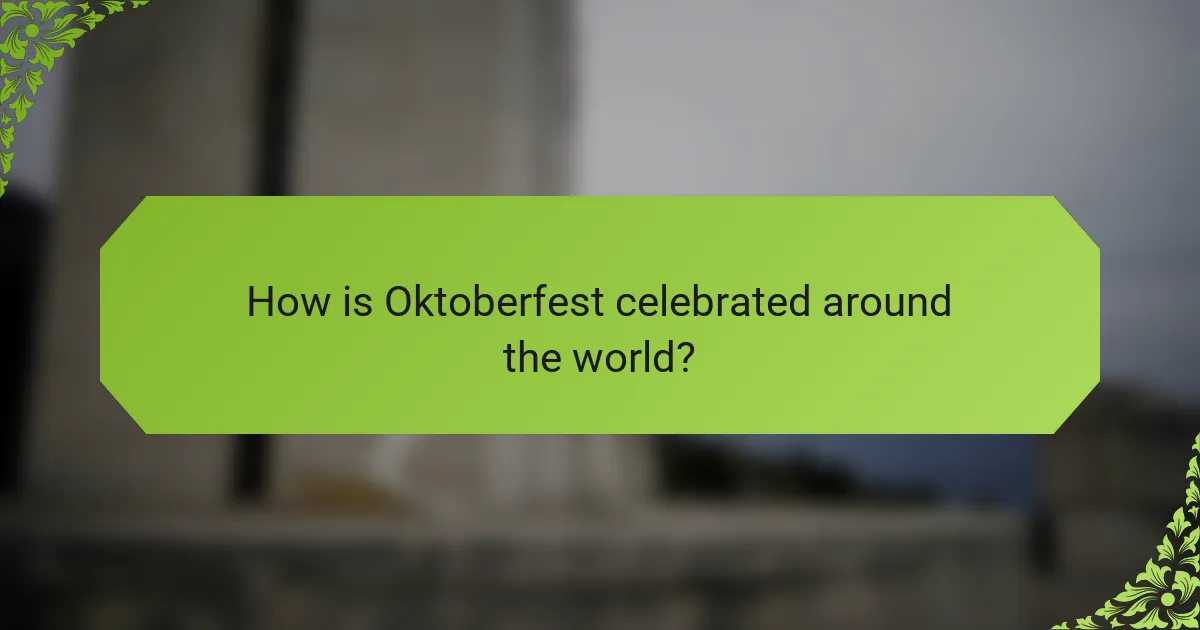
How is Oktoberfest celebrated around the world?
Oktoberfest is celebrated globally through local festivals, beer gardens, and cultural events that reflect Bavarian traditions. In countries like the United States, Australia, and Brazil, communities host Oktoberfest events featuring traditional music, food, and, of course, beer.
Cities such as Munich remain the heart of Oktoberfest, attracting millions annually. However, international celebrations often include unique local twists, showcasing regional cuisines and customs. For example, in the U.S., some festivals incorporate craft breweries, highlighting a diverse range of beers.
Oktoberfest’s global influence fosters cultural exchange and community bonding, making it a cherished celebration beyond Germany. The shared experience of enjoying food and drink strengthens connections among attendees, regardless of location.
Which countries have adopted Oktoberfest traditions?
Countries that have adopted Oktoberfest traditions include Germany, the United States, Canada, Australia, Brazil, and Japan. These nations celebrate with beer festivals, parades, and traditional German cuisine, reflecting the original Munich event’s spirit. For example, the U.S. hosts large Oktoberfest celebrations in cities like Cincinnati and Denver, showcasing local adaptations of Bavarian customs.
What unique local variations exist in international celebrations?
Oktoberfest has unique local variations that reflect cultural adaptations. In the United States, for example, celebrations often include craft beers and local foods, differing from the traditional German fare. In Brazil, Oktoberfest features a mix of German and Brazilian music, showcasing local talent. In Australia, the festival emphasizes family-friendly activities and outdoor events, diverging from the original Munich atmosphere. Each location incorporates regional customs, resulting in distinct experiences while honoring the core spirit of Oktoberfest.
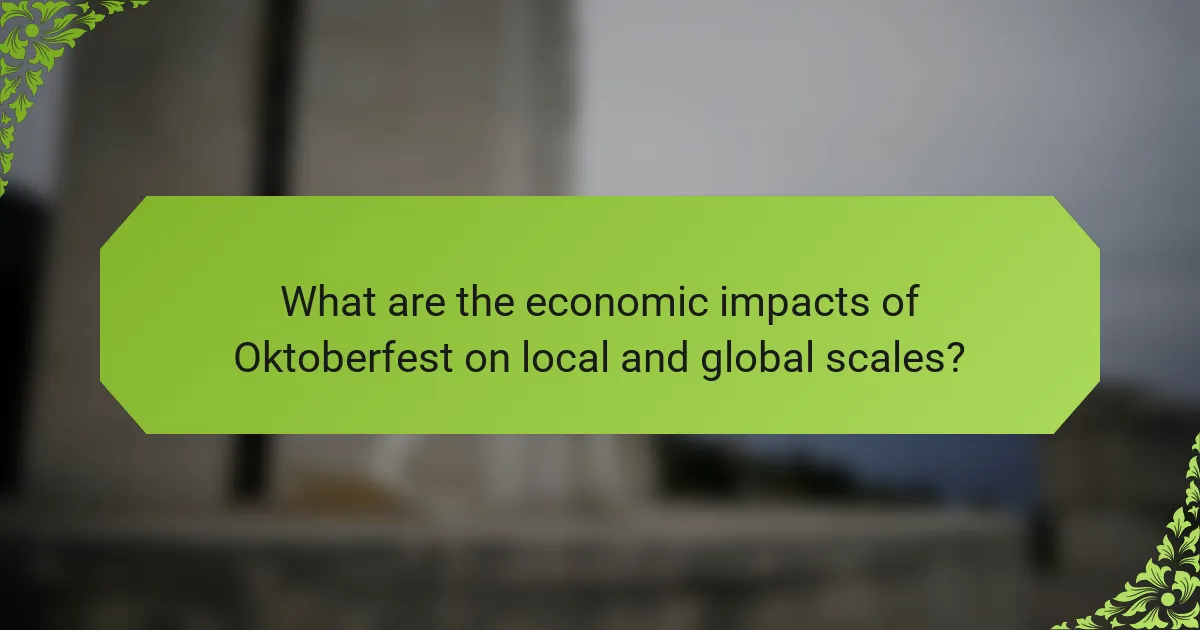
What are the economic impacts of Oktoberfest on local and global scales?
Oktoberfest significantly boosts local economies through tourism and job creation, while also influencing global beer culture. The festival draws millions of visitors, generating approximately €1.2 billion in economic activity annually. Local businesses, including breweries and restaurants, benefit directly from increased sales. Globally, Oktoberfest promotes German beer brands, enhancing their international presence and fostering cultural exchange. The festival’s traditions and customs have inspired similar events worldwide, further amplifying its economic impact.
How does Oktoberfest contribute to tourism in its host city?
Oktoberfest significantly boosts tourism in Munich by attracting millions of visitors each year. The festival showcases Bavarian culture, food, and beer, creating a unique experience that draws both international and local tourists. In 2019, Oktoberfest welcomed over 6 million visitors, generating approximately 1.2 billion euros in economic impact. This influx supports local businesses, hotels, and restaurants, reinforcing the city’s status as a premier travel destination. The event’s global influence also inspires similar festivals worldwide, further enhancing Munich’s reputation.
What are the business opportunities that arise during the festival?
Oktoberfest presents various business opportunities, particularly in hospitality, retail, and tourism sectors. Vendors can capitalize on increased foot traffic by offering food, beverages, and merchandise. Event organizers can create unique experiences, drawing in larger crowds and sponsorships. Local businesses benefit from heightened visibility and sales during the festival. Additionally, online platforms can leverage Oktoberfest-themed promotions, enhancing engagement and attracting customers. Overall, the festival fosters economic growth and community involvement.
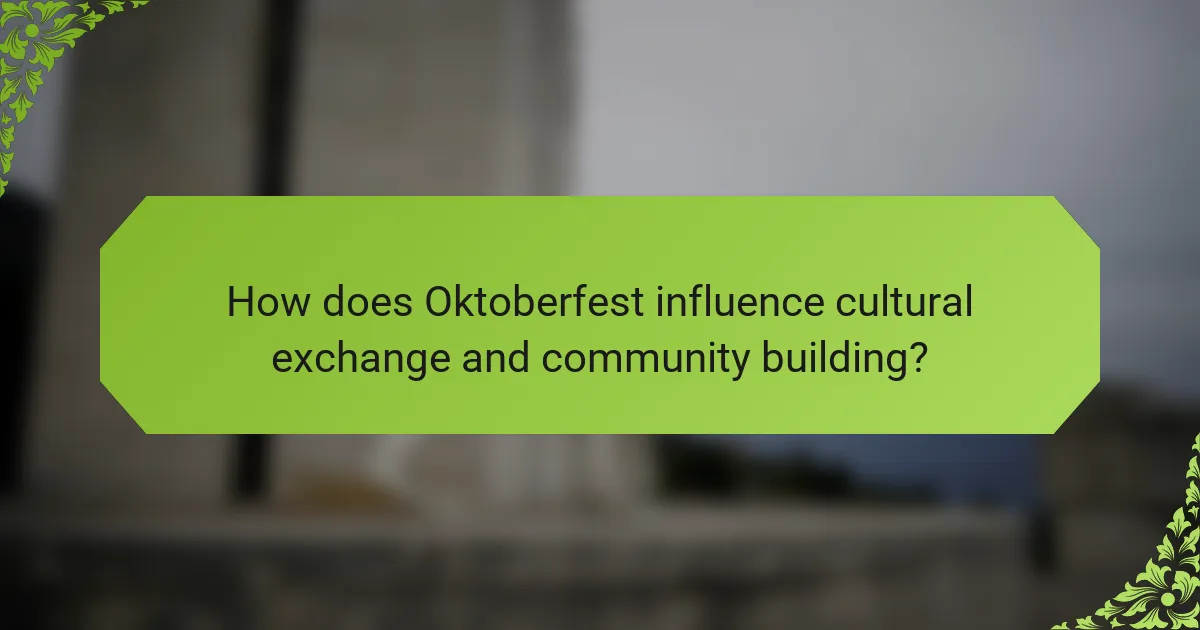
How does Oktoberfest influence cultural exchange and community building?
Oktoberfest fosters cultural exchange and community building through shared traditions, food, and music. This festival attracts millions globally, promoting interaction among diverse groups. Participants experience German culture firsthand, enhancing mutual understanding. Events like traditional dances and culinary offerings create lasting connections. Oktoberfest’s global influence encourages similar celebrations worldwide, further enriching local communities.
What role do music and entertainment play in fostering connections among attendees?
Music and entertainment play a crucial role in fostering connections among attendees at Oktoberfest. They create a lively atmosphere that encourages social interaction. Live performances and traditional music enhance cultural immersion, allowing participants to bond over shared experiences. Additionally, engaging activities like dance and games promote camaraderie among diverse groups. This communal enjoyment strengthens relationships, making the festival a memorable gathering for all.
How do local communities participate in and benefit from the festival?
Local communities actively participate in Oktoberfest by showcasing their traditions and benefiting economically. They engage through cultural performances, food stalls, and craft displays that reflect local heritage. This involvement fosters community pride and strengthens social bonds. Additionally, local businesses gain substantial revenue from increased tourism, enhancing their sustainability. The festival creates a platform for cultural exchange and promotes regional products, further enriching the community’s identity and economic landscape.

What are the environmental considerations surrounding Oktoberfest?
Oktoberfest has significant environmental considerations, including waste management, energy consumption, and water usage. The festival generates substantial waste, prompting organizers to implement recycling and composting initiatives. Energy consumption is high due to large-scale food preparation and entertainment, leading to a push for renewable energy sources. Water usage is also critical, especially for beer production, necessitating sustainable practices to minimize impact. These factors reflect Oktoberfest’s commitment to environmental sustainability while maintaining its cultural heritage.
How is sustainability being integrated into festival practices?
Sustainability is increasingly integrated into Oktoberfest practices through waste reduction, local sourcing, and eco-friendly initiatives. The festival now emphasizes recycling and composting to minimize waste. Local breweries and food vendors are prioritized, reducing transportation emissions. Additionally, energy-efficient lighting and sustainable materials are used in festival infrastructure. These efforts reflect a growing commitment to environmental responsibility within large-scale events.
What challenges arise in managing waste and resources during large-scale events?
Managing waste and resources during large-scale events like Oktoberfest presents significant challenges. These include high volumes of waste generation, resource allocation, and sustainability efforts.
Oktoberfest attracts millions, resulting in substantial food and beverage waste. Efficient waste management systems are crucial to minimize environmental impact. The festival employs recycling and composting to divert waste from landfills.
Resource allocation is complex, requiring coordination among vendors, staff, and local authorities. Effective communication ensures that resources are efficiently utilized.
Sustainability initiatives are increasingly prioritized. Oktoberfest aims to reduce its carbon footprint through eco-friendly practices, such as using biodegradable materials and promoting public transport.
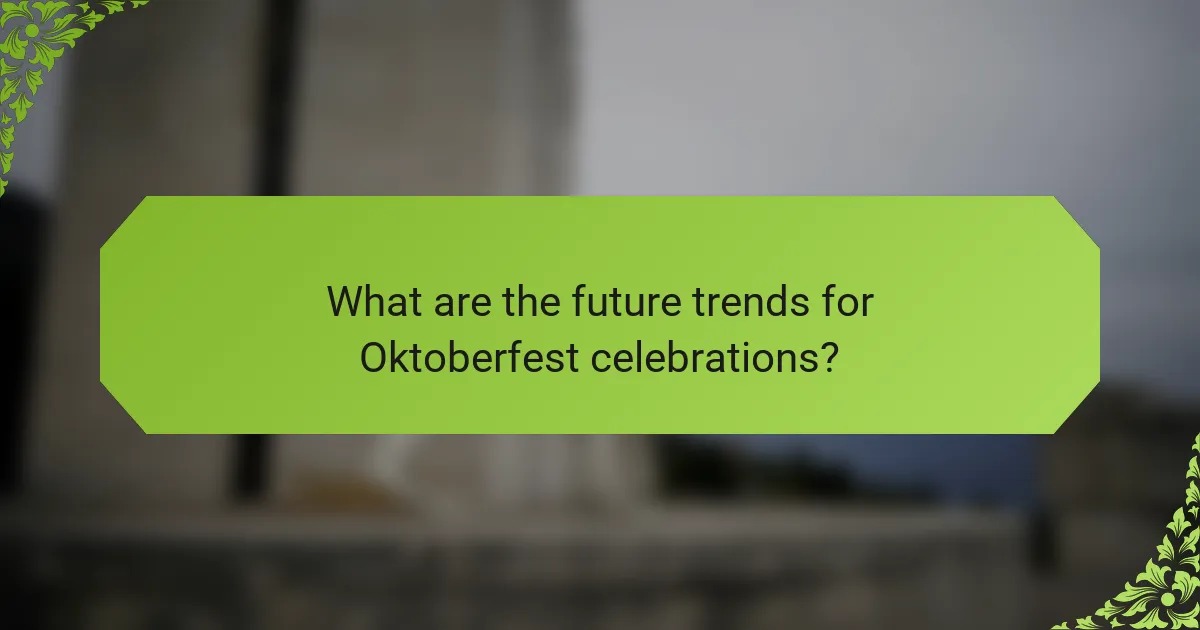
What are the future trends for Oktoberfest celebrations?
Oktoberfest celebrations are evolving to emphasize sustainability, digital engagement, and diverse culinary experiences. Future trends include eco-friendly practices, such as using biodegradable materials and local sourcing of ingredients, which enhance the festival’s environmental responsibility. Digital platforms will facilitate virtual participation, allowing global audiences to engage with Oktoberfest remotely. Additionally, there will be a growing focus on international cuisines, reflecting the festival’s global influence and appealing to a wider audience.
How is technology shaping the experience for attendees?
Technology enhances attendee experiences at Oktoberfest through interactive apps, virtual reality, and social media engagement. These tools facilitate navigation, real-time updates, and community building among festival-goers. For example, mobile apps provide maps, schedules, and food menus, improving accessibility. Virtual reality experiences offer immersive previews of festival attractions, attracting a broader audience. Social media platforms amplify event visibility, fostering connections and sharing memorable moments. This integration of technology transforms Oktoberfest into a more engaging and accessible celebration.
What innovations are being introduced to enhance cultural engagement?
Innovations enhancing cultural engagement at Oktoberfest include digital experiences, sustainability initiatives, and interactive programming. Virtual reality tours allow global audiences to experience the festival remotely. Eco-friendly practices, such as waste reduction and local sourcing, promote sustainability. Interactive workshops and cultural performances deepen participant involvement, fostering a sense of community. These innovations reflect Oktoberfest’s commitment to evolving while preserving its rich traditions.
What best practices can be adopted for hosting successful Oktoberfest events?
To host successful Oktoberfest events, focus on authentic experiences, quality beer, and engaging activities. Incorporate traditional music and food to enhance the atmosphere.
1. Select a venue that reflects Bavarian culture.
2. Offer a variety of local and international beers.
3. Organize traditional games and competitions.
4. Provide authentic German cuisine.
5. Promote the event through social media and local partnerships.
6. Ensure safety measures for attendees.
